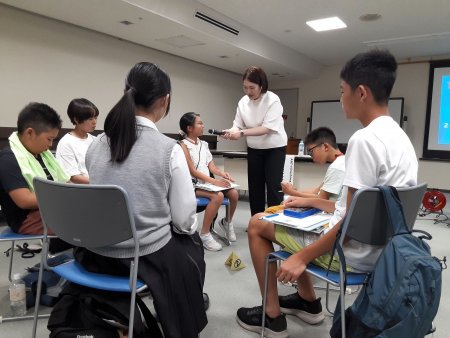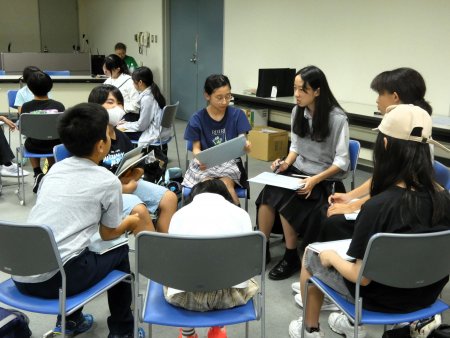From August 4th to 5th, 2025, the Hiroshima Consumers' Co-operative Union and JCCU jointly held the "2025 Peace Action in Hiroshima," with approximately 3,300 participants, including online attendees from across Japan.
Peace Action is a unique initiative by Consumer Co-ops to think about peace through various themes, such as passing on the war and A-bomb experiences, global wars and conflicts, military base issues, and the Constitution. Study lectures and exchange meetings are held every year in Hiroshima, Nagasaki and Okinawa. In Hiroshima, the Hiroshima Action (renamed "Peace Action in Hiroshima" in 2004) began in 1978, and this year marks its 48th anniversary.
This year, to mark the 80th anniversary of the atomic bombing and post-war period, a total of twelve events were held, focusing on passing down experiences to the next generation. These programs included initiatives involving young people engaged in peace activities, as well as lectures from those dedicated to sharing stories about the atomic bombing.
• Study Lecture
Ms. KOYAMA Misa, who gave a lecture at last year's Children's Peace Conference, spoke about "the realities of people affected by the atomic bomb (hibakusha) who are not officially recognized" and "the actual effects of the black rain that fell after the atomic bombing." She also discussed global impacts of such events, and Ms. Maira ABENOVA, visiting from Kazakhstan, shared her insights as well.
Center: Ms. KOYAMA Misa; to her right: Ms. Maira ABENOVA.
They brought along drawings made by children from Semipalatinsk (the nuclear test site in Kazakhstan).
• Participatory Reading Session of Atomic Bomb Poems Written by Children
Together with the "Theatrical group Flat", participatory reading session was held in which participants read aloud poems about the atomic bomb written by children. Divided into small groups, participants practiced reading while reflecting on the feelings of the children who wrote the poems.
• Children's Peace Conference
This program engages children, the future bearers of peace, in preparatory learning and workshops to learn about and reflect on peace together. While last year's conference was held in a hybrid format, this year it was conducted entirely in person. A total of 39 children, ranging from elementary to high school students, gathered from across the country.
Facilitated by Ms. WATANABE Kuniko from ANT-Hiroshima, the participants discussed and reflected on issues of peace. The opinions expressed during the conference were later compiled by the student chairpersons (high school students) and presented as an appeal statement during the 'Niji-no Hiroba(Rainbow stage)' segment of the Peace Action in Hiroshima on August 5.
Excerpt from the Appeal Statement
This year marks 80 years since the atomic bombings. How can we ensure that war and nuclear weapons are never used again? What if we replace the word "war" with a more familiar term, like "fight"? To stop a fight, we respect each other's opinions, discuss matters calmly, and listen to others fully without denying their views. Don't you think that would stop the fight?
What should we do to convey the realities of past wars and the value of peace? We are said to be the last generation that can hear the stories of atomic bomb survivors directly, so we must listen carefully, understand, and pass them on. Those who hear these stories can share them with friends and family, who in turn share with others, gradually expanding the circle of people who understand.
To expand this circle, it is important for each individual to take initiative--researching and sharing information on social media and the internet, participating in events, and being proactive in their awareness and actions.
Why not start by taking this first step?


Left: Ms. WATANABE Kuniko of ANT-Hiroshima, standing in the center.
• Niji-no Hiroba(Rainbow stage)
This event, the climax of the Peace Action in Hiroshima, was attended by approximately 2,300 participants from across Japan, including online attendees.
Representing the organizers, ARAI Chitose, President of JCCU, delivered the opening remarks. After receiving greetings from guest speakers, including Mr. MATSUI Kazumi, Mayor of Hiroshima, and Mr. SUZUKI Shiro, Mayor of Nagasaki (via video message), there were testimonies from A-bomb survivors, presentations on activities by local high school students, and choral performances.
(Left) ARAI Chitose, President of JCCU
(Right) Mr. MATSUI Kazumi, Mayor of Hiroshima
(Left) Niji-no Hiroba(Rainbow stage) Choir
(Right) Mr. HAMASUMI, Assistant General Secretary of the Japan Confederation of A- and H-Bomb Sufferers Organizations (Nihon Hidankyo)
(Left) Calligraphy Performance by Yasuda Girls' Senior High School and Yasuda Women's University
(Right) Presentation of the Children's Peace Conference Appeal Statement
Under our slogan "For Peace and Better Life," we recognize the importance of passing on the realities of war and atomic bomb experiences, and of conveying to the next generation our hope for a world without war and nuclear weapons. Today's "Niji-no Hiroba(Rainbow stage)" is one of these initiatives.
The world now faces an unprecedented crisis for peace. The Russian invasion of Ukraine has continued for over three years, and the threat of nuclear weapon use has become increasingly real. At the same time, the conflict between Israel and the Gaza Strip in Palestine is escalating, putting many lives, including those of children, at risk. Unfortunately, the number of nuclear weapons in the world is also on the rise.
Last year, Mr. TANAKA Terumi, a representative committee member of the Japan Confederation of A- and H-Bomb Sufferers Organizations (NIHON HIDANKYO), which received the Nobel Peace Prize, sent a powerful message: "At any time, any of you could become a victim, or perhaps even a perpetrator. Co-ops are organizations where conversation and dialogue are possible, so please expand the circle of empathy toward nuclear abolition." Today, we are also honored to have Mr. MIMAKI Toshiyuki, the chairman of Japan Confederation of A-and H-Bomb Sufferers Organizations (NIHON HIDANKYO), with us.
Moving forward, together with our colleagues across the country, we hope to continue creating spaces where we can reflect on and discuss peace in our daily lives, expand the circle of dialogue and empathy, and share these values with local communities.
Related JCCU News: